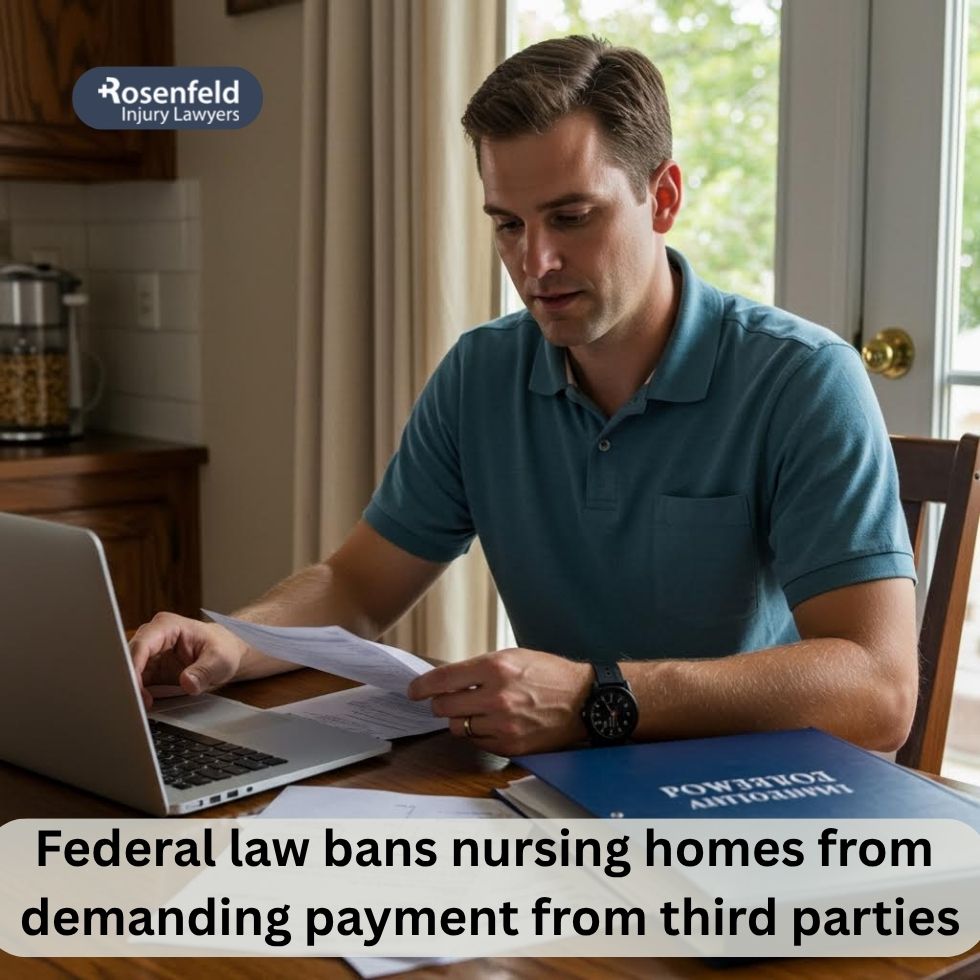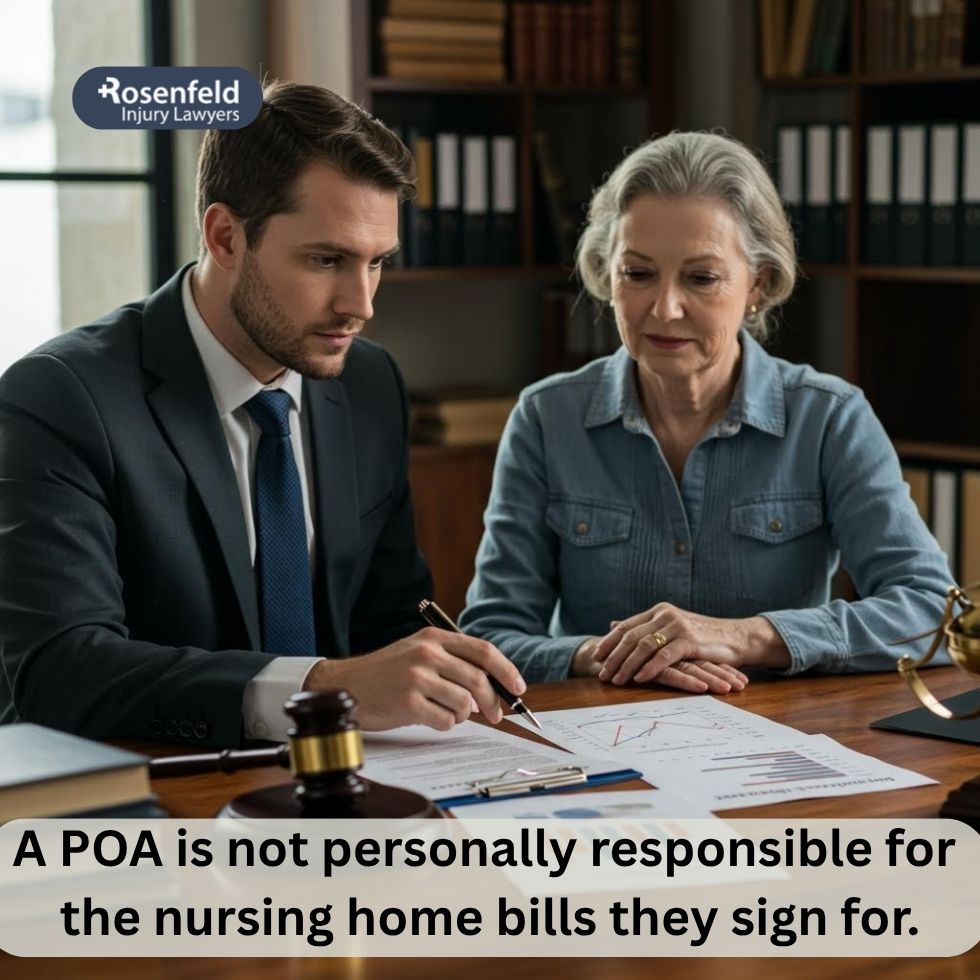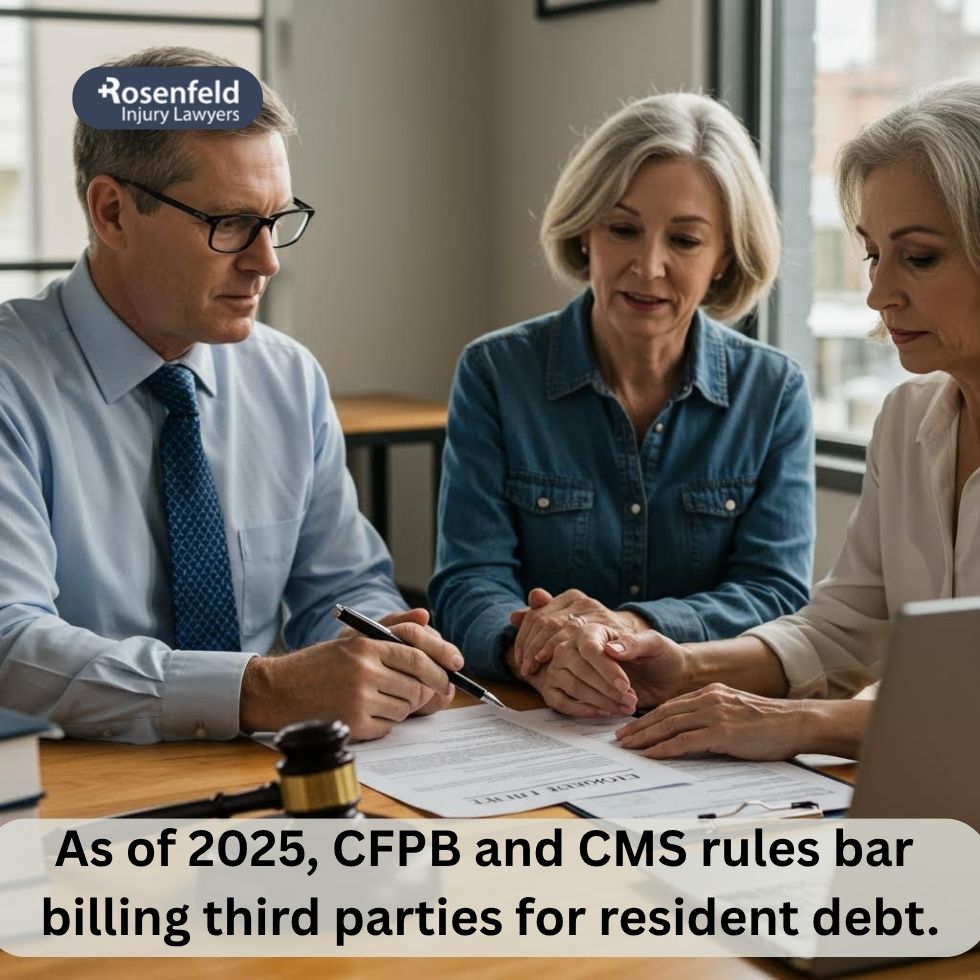- 24/7 Free Consultation: (888) 424-5757 Tap Here To Call Us
Is Power of Attorney Responsible for Nursing Home Bills?

When an aging loved one loses the ability to make decisions independently, families often turn to a power of attorney to help manage their legal, financial, and healthcare needs. But many people ask, is power of attorney responsible for nursing home bills?
This legal arrangement allows someone to act on the senior’s behalf without the complexity of pursuing full guardianship, but it does not make the appointed person personally liable for the resident’s debts.
Instead, power of attorney grants authority to act in the senior’s best interest without creating financial responsibility. This article breaks down how power of attorney works and clarifies what it does—and does not—mean for those helping manage a loved one’s care.
Power of Attorney vs. the Role of an Estate Planning Attorney
A thoughtful estate plan addresses what happens after death and outlines who can step in if someone loses the ability to make medical or financial decisions. An experienced estate planning attorney can help draft the necessary paperwork, allowing families to appoint a trusted person as their power of attorney.
A power of attorney gives someone the legal authority to act on behalf of a senior, also known as the principal. Depending on how broad or limited the authority is, this can include managing money, handling health care decisions, signing contracts, or accessing financial accounts.
Establishing this role early, with the help of a knowledgeable estate planning attorney, helps avoid confusion, delays, or costly court involvement later on.

Admission Agreement and Nursing Home Contract
When a loved one enters a long-term care facility, families are often asked to sign an admission contract or nursing home facility agreement during the intake process. These documents can be intimidating and confusing, especially when they include clauses assigning financial responsibility to someone other than the resident.
It’s common for facilities to include language that labels an adult child or relative as a “responsible party,” even if that person is only acting under a power of attorney. While this title may sound administrative, signing without fully understanding the implications can lead to unintended financial obligations.
Before signing any agreement, it’s critical to review the terms carefully and consider consulting an attorney. Facilities cannot legally require a third party to take on financial responsibility for a resident’s care, but vague or misleading contract language can create legal confusion. Understanding your rights under Illinois law can help avoid costly misunderstandings.
What to Know About Power of Attorney and Nursing Home Costs
When an elderly parent needs full-time care, families often rely on a power of attorney (POA) to manage day-to-day decisions. This legal document can help avoid lengthy guardianship proceedings and allow a designated power when the parent can no longer handle their own legal matters or medical decisions.
However, confusion still surrounds what financial obligations a POA may take on, especially in relation to nursing home costs. An attorney experienced with nursing homes and POA relations can help you understand the limits of your authority, can help you avoid personal liability, and protect your financial well-being.
What Power of Attorney Allows and Doesn’t Allow
A power of attorney gives someone legal authority to make decisions for another person, called the principal. This may include managing finances, handling medical decisions, and signing contracts at a nursing home or assisted living facility. Depending on the estate plan and how the POA is written, the role can be broad or limited.
However, this legal role does not create an attorney-client relationship or make the attorney-in-fact responsible for the principal’s expenses. A POA allows you to pay bills and handle financial matters using the principal’s assets, not your own money.
While you may have access to financial accounts, you do not assume liability for the resident’s bill unless you agree to it in writing.
What Power of Attorney Can Legally Do
A power of attorney grants someone the authority to make decisions on behalf of another person (the principal), especially when that person can no longer act independently. These powers may include:
- General authority to make legal, financial, or personal decisions in the principal’s name.
- Healthcare decision-making including choices about treatment, care plans, or medical consent.
- Financial management, such as paying bills, accessing bank accounts, and managing investments using the principal’s funds.
- Contract signing, including agreements related to housing, care facilities, or other services the principal requires.
This list can vary depending on how the POA document is written. The scope should be clearly defined in the estate plan and revisited with a nursing home lawyer who is well-versed in estate plans if responsibilities change over time.

Can Adult Children Face Financial Responsibility?
In most cases, adult children are not financially responsible for their parents’ bills. However, issues arise when someone signs a nursing home contract without reviewing the fine print. Some facilities include third-party guarantee language that may create unintended financial obligations. That’s why it’s important to review all agreements carefully.
There are rare situations where children may be held responsible. If someone misuses the parents’ money or fails to apply for Medicaid once assets run out, courts may find them liable for expenses incurred.
These cases are uncommon, but they highlight the need to handle financial power carefully. Filial responsibility laws exist in some states but are rarely enforced and do not currently apply in Illinois.
Understanding Filial Responsibility Laws in Illinois
Some states have filial responsibility laws, which allow long-term care facilities to sue children for a parent’s unpaid nursing home bills. These state laws are designed to reduce the burden on public programs like Medicaid by shifting costs to family members. However, they’re rarely enforced, and Illinois is one of the states that does not apply them.
That means children in Illinois cannot be sued solely because their parents cannot pay. Financial obligations only arise if someone misuses a parent’s money or signs a contract agreeing to pay as a responsible party. Simply serving as a power of attorney does not trigger liability under these laws.
Understanding this legal protection can provide peace of mind when making difficult care decisions. If you’re unsure about what’s enforceable or have concerns about a contract’s language, consulting an attorney can help you avoid personal liability and protect your family’s finances.
How Nursing Homes Make Family Members Personally Liable
Some agreements include misleading terms that appear to make family members responsible for a loved one’s nursing home bills. Titles like “responsible party” or hidden third-party guarantees can expose someone acting under a power of attorney to unpaid bills if not reviewed carefully.
While you may help manage finances, you are not automatically personally liable for medical bills or other nursing home expenses unless you sign a contract agreeing to that responsibility. Always review documents closely and seek legal counsel before signing. Avoid using your personal funds or assuming liability without clear legal advice.

How Nursing Home Residents Pay for Their Care
Most nursing home residents start by covering nursing home bills with their own assets, such as Social Security, personal savings, or other personal funds.
When funds run out, Medicaid benefits may help, but the application must be timely and complete. A power of attorney can:
- Use the principal’s funds to manage expenses.
- Act on the resident’s behalf for financial or healthcare decisions.
- Apply for Medicaid benefits or other support programs without becoming personally liable.
Families managing finances for an elderly parent should speak with an estate planning attorney to avoid missteps that lead to unpaid bills or benefit denial. If legal language is unclear or missing, consult legal counsel before signing or submitting documentation.
When Nursing Homes Violate Discharge Rules
If the resident cannot pay, the nursing home may attempt to discharge them. However, federal regulations prohibit nursing homes from removing a resident without making safe discharge arrangements. Placing an elderly parent in a hotel or an unsafe setting without medication may constitute nursing home abuse.
Residents cannot be evicted solely for needing Medicaid unless the facility does not accept it. If your loved one is improperly discharged or harmed due to payment issues, an experienced lawyer can help you pursue action. The responsible parties may be held accountable for violating care standards.
When Nursing Home Behavior Crosses the Line
Sometimes, issues go beyond managing nursing home bills. If a facility wrongfully discharges a resident, withholds care based on finances, or provides substandard medical care, it may become a personal injury case.
A law firm familiar with elder care litigation can help in situations involving:
- Neglect or inadequate treatment
- Wrongful discharge tied to unpaid or disputed bills
- Denied services that impact care or violate rights
In these cases, the person responsible under a general power of attorney may need to act quickly. With proper financial power, they can authorize care decisions without accepting personal financial liability.
Families May Need Legal Help
Sometimes, a nursing home’s behavior can cross the line to nursing home abuse.
Nursing home abuse attorneys can work to ensure that the nursing home is held liable for the following things:
- Abuse or neglect
- Medical malpractice
- Wrongful death
- Falls
- Bedsores
Your family may be paid financial compensation if the nursing home’s actions have injured your loved one. First, you need to hire an experienced Chicago nursing home abuse and neglect attorney to hold the facility legally accountable.
Nursing homes must be held accountable for the abuse and poor care they provide. Filing a nursing home lawsuit is one way to get justice and accountability.
However, nursing homes often fight liability vigorously to escape accountability for their actions.
Frequently Asked Questions About Power of Attorney for Nursing Homes
Can a POA Holder Be Held Liable for the Principal’s Financial Obligations?
No, a POA holder is not personally responsible for nursing home bills or medical bills unless they sign a contract agreeing to pay from their own funds.
What Does a Financial Power of Attorney Authorize?
A financial POA grants legal authority to manage the principal’s assets, pay bills, and apply for benefits without making the individual financially liable.
Who is Typically Financially Responsible for Nursing Home Bills?
The resident is usually responsible for paying nursing home expenses using their own income or assets. A POA does not shift that obligation.
What is the Role of a Power of Attorney in Estate Planning?
A POA is a key part of an estate plan. It allows someone to handle nursing home care decisions and financial matters if the senior becomes incapacitated. A law firm can help ensure it’s properly drafted.
Secure Expert Legal Counsel!

Our nursing home abuse attorneys at Rosenfeld Injury Lawyers practice law diligently and compassionately. Nursing homes are not above the law, and we work to make them answer for what they did to your loved one.
To schedule your free initial consultation, call (888) 424-5757 or fill out our contact form.
We may work to obtain a settlement for your family, or we will take your case to court. As always, you owe us nothing unless you win your case.
All content undergoes thorough legal review by experienced attorneys, including Jonathan Rosenfeld. With 25 years of experience in personal injury law and over 100 years of combined legal expertise within our team, we ensure that every article is legally accurate, compliant, and reflects current legal standards.







